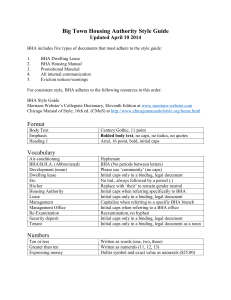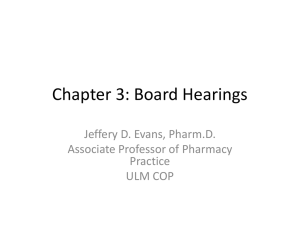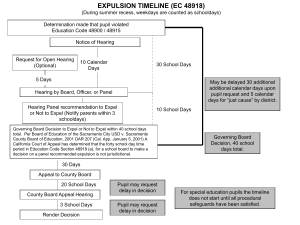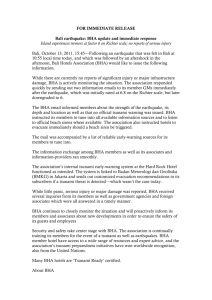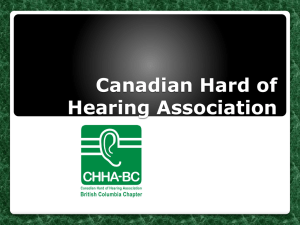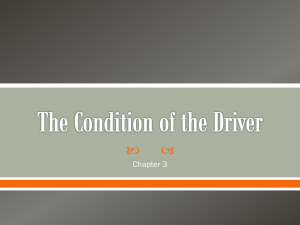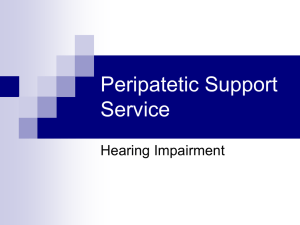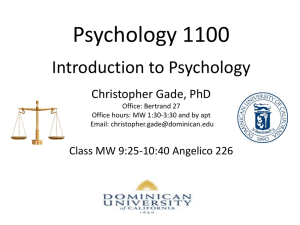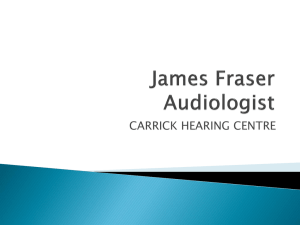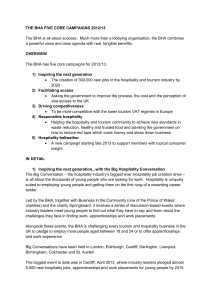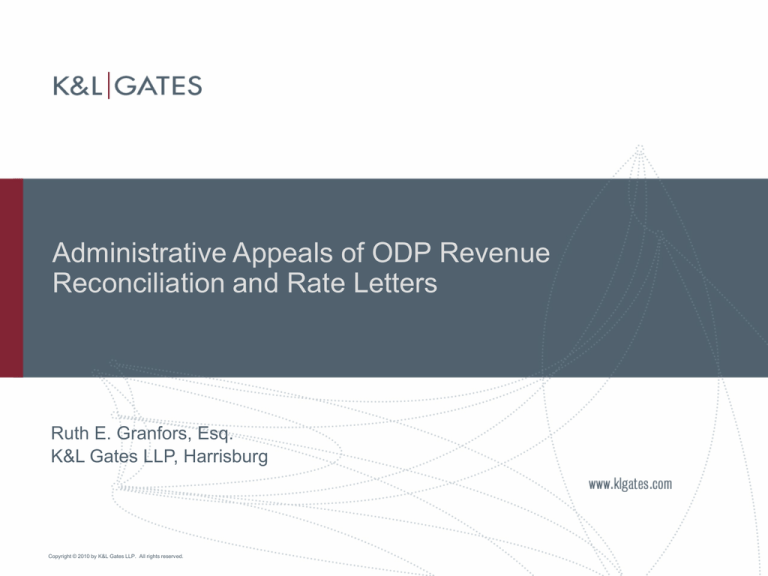
Administrative Appeals of ODP Revenue
Reconciliation and Rate Letters
Ruth E. Granfors, Esq.
K&L Gates LLP, Harrisburg
Copyright © 2010 by K&L Gates LLP. All rights reserved.
Introduction
Context for presentation
4th quarter revenue reconciliation, 2009-2010
Revenue reconciliation in 2010-2011
Rate letters for 2010-2011
Options
Informal communications with ODP
Formal legal process
Association activities
Nature of legal process
1
General Rule
A provider that is aggrieved by a decision of the
Department of Public Welfare regarding the
Medical Assistance Program may request a
hearing before the Bureau of Hearings and
Appeals.
67 Pa.C.S.A. § 1102(a)
2
What is meant by “aggrieved”?
A provider is aggrieved if the Department’s action
“adversely affects the property rights, privileges,
immunities, duties, liabilities or obligations of the
provider.”
55 Pa. Code § 41.31(b)
3
Bureau of Hearings and Appeals (BHA)
Secretary of
Public Welfare
Office of
Administration
Office of Medical
Assistance
Programs
Office of
Developmental
Programs
Bureau of Hearings
and Appeals
4
Statute and Applicable Rules
Statute - 67 Pa.C.S.A. §§ 1101-1106
(attachment)
Regulations:
55 Pa. Code, Chapter 41
(www.pacode.com/secure/data/055/chapter41/chap41toc.html)
General Rules of Administrative Practice and
Procedure (“GRAPP”)
(www.pacode.com/secure/data/001/partIItoc.html)
5
Conduct of BHA
Among other things, the BHA is required under law to:
Act independently of the employees or officials
whose actions are under review.
Not engage in “ex parte communications” with
any party to a hearing.
Allow “reasonable and necessary discovery.”
Conduct “de novo review” of all factual and legal
issues raised by the provider.
67 Pa.C.S. § 1102(e)(2)
6
Initiating an Action in the BHA
A provider that wishes to contest a decision of a
program office specific to that provider files a
document titled a Request for Hearing.
Other documents to initiate an action under Chapter
41 include:
Petition for Relief
Request for Supersedeas
Waiver Requests
7
Filing of Request for Hearing
Provider must file “within 30 days of the date of the
notice of the departmental action” or, if notice of action
is by mail, “within 33 days of the date of the notice.”
67 Pa.C.S.A. §1102(b)
PA Supreme Court found that a DPW letter with a
stamped date and a statement of a right to appeal
within 33 days of the date of the letter, with no mailing
date, is sufficient to begin appeal period.
8
Timeliness of Request for Hearing
When filing a request for hearing by first-class mail,
the United States postmark is the filing date. Thus,
the appeal must be postmarked within 33 days of
notice of DPW determination (if notice was given by
mail).
If the request for hearing is filed in any other
manner, e.g., in person or overnight delivery, the filing
date is the date it is received by the Bureau.
Possibility of appeal filed “nunc pro tunc.”
9
Request for Supersedeas
The filing of a Request for Hearing does not act as a
supersedeas, or stay, of the program office action. A
separate request must be filed. The BHA may grant a
supersedeas if:
Irreparable harm to petitioner;
Likelihood of success on the merits; and
Likelihood of injury to the public or third parties.
67 Pa.C.S. § 1103
10
Content of Request for Hearing
Name, address and telephone number of the
provider.
Detailed reasons why the provider believes the
agency action is factually or legally erroneous.
Identification of the specific issues that the provider
is raising.
The relief the provider is seeking.
11
Expediting the Hearing
Certain requests for hearing are automatically
expedited, including:
Denial of payment of claims requiring prior
authorization.
The recovery of overpayments through the
utilization review process.
The denial of claims on prepayment review.
The denial of claims for payment based upon
invoice.
12
Expediting the Hearing (cont.)
The BHA may expedite matters under appeal that do
not fall within one of the specific categories of appeals
for which expedited hearings are automatic if the
provider/appellant and the program office file a joint
motion to expedite.
13
Effect of Expedited Hearing
The case is heard more quickly.
Certain procedures do not apply, including:
No pre-hearing orders
No discovery
No mandatory disclosures or position papers
No dispositive motions (e.g., motions to dismiss;
motions for summary judgment)
Parties who obtain an expedited hearing may ask
that some of these procedures apply.
14
Pre-hearing Process
Scheduling Order
Mandatory Disclosures
Discovery
Position Papers
Dispositive Motions
15
Hearing Process
May request that a matter be decided without a
hearing:
Provider would be required to waive right to
hearing.
Parties would need to stipulate to material facts,
or agree to submit direct and rebuttal testimony
in the form of affidavits (no cross-examination) or
by deposition.
BHA would need to determine that there is no
issue of material fact.
16
Hearing Process (cont.)
Hearings are conducted in a trial-like manner, with
opening statement, direct examination and crossexamination of witnesses, objections, and closing
arguments.
Provider typically carries burden of proof:
Provider must first establish a prima facie case
by a preponderance of the evidence.
The program office must offer evidence rebutting
provider’s case.
17
Post-hearing Process
Preparation of hearing transcript
Post-hearing briefs:
May be waived.
Must include proposed findings of fact
referencing exhibits or testimony from transcript,
legal argument and proposed conclusions of law.
If briefs filed, disputed factual issues or legal
arguments that are not addressed in the brief are
deemed waived.
Provider files brief first, program office 30 days
after.
18
Post-hearing Process (cont.)
The record may be re-opened if:
Recently discovered evidence that
conconclusively establishes or contradicts a
material fact;
Evidence could not have been discovered prior
to the close of the record through the exercise of
due diligence; and
Evidence does not simply substantiate other
existing evidence of record.
Alternatively, record may be reopened if there is a
change in law that affects the evidence.
19
Post-hearing Process (cont.)
BHA decision issued with 30 days.
Within 30 days, either party, if aggrieved by the BHA
decision, may ask the Secretary of Public Welfare to
review.
Under the rules, the program office is deemed to be
aggrieved if:
The provider prevails, in whole or part;
The BHA interprets a statute, regulation, policy or
bulletin inconsistent with the program office
interpretation; or
The BHA alters an existing or imposes a new policy
on the program office.
20
Post-hearing Process (cont.)
Review by the Secretary:
Discretionary, not a matter of right.
If the Secretary fails to act in 30 days, the review
is deemed denied.
If review is granted, an answer to the request for
review may be filed by the opposing party.
The Secretary must issue a decision on the
review within 180 days of granting the review.
21
Final Agency Adjudication
If no request for review of the BHA decision by the
Secretary within 30 days, the BHA decision is the final
agency adjudication.
If a request for review by the Secretary is made
within 30 days, but the Secretary denies review or
fails to act within 30 days, the BHA decision is the final
agency adjudication.
If the Secretary grants review of the BHA decision,
the Secretary’s decision is the final agency
adjudication.
22
Appeal to Commonwealth Court
A final agency adjudication may be appealed to the
Commonwealth Court of Pennsylvania.
Under Chapter 41, the provider may appeal an
adverse action, but the program office may not file an
appeal.
The appeal must be filed within 30 days of the final
agency adjudication.
23
Petitions for Relief
Petitions for Relief are not to be used to raise
issues that can be brought in a Request for Hearing or
vice versa.
The BHA may not issue final decisions on Petitions
for Relief. It may only issue recommendations to the
Secretary of Public Welfare.
24
Petitions for Relief (cont.)
Petition for Issuance, Amendment, Deletion or
Waiver of a Regulation under 1 Pa. Code § 35.18
Petition for Declaratory Order under 1 Pa. Code §
35.19
25
Waiver Requests
A request to waive a regulation as applied to a
specific provider in a specific action by a program
office may be included in a Request for Hearing.
The BHA may not grant the waiver relief, but may
must make a recommendation to the Secretary of
Public Welfare.
26
Contact Information:
Ruth E. Granfors
717-231-5835
ruth.granfors@klgates.com
27

